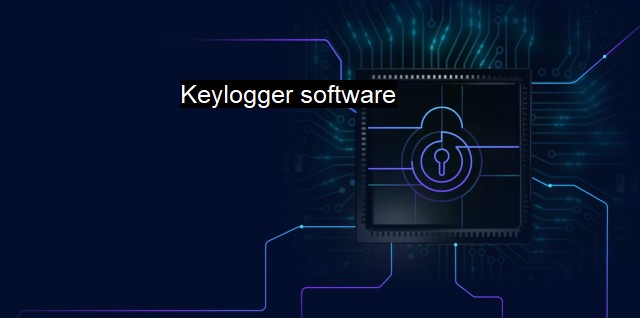What is Keylogger software?
Keylogger Software: How It Works and How to Protect Your Privacy
Keylogger software refers to a type of monitoring software designed to record each keystroke made by a user on a specific computer's keyboard. This cyber tool becomes a threat when used maliciously by hackers for harmful acts such as stealing personal information, financial data, usernames, and passwords discretely without the user's knowledge. Cybersecurity companies categorize keyloggers as a form of malware due to their potential for misuse.Named after their function, "keylogger" is a blend of two words, "keys," referring to the keyboard keys, and "logger," meaning to record. These software are dauntingly effective and deceptive due to their ability to run in the background, escaping the user's attention while they perform daily activities on their computer. Unsurprisingly, keyloggers serve as a favorite tool for cybercriminals, providing an accurate recording of sensitive data.
There exists two primary types of keylogger software: hardware and software keyloggers. Hardware keyloggers function through physical devices attached to the computer, which can record data even before the operating system begins. On the other hand, software keyloggers, ubiquitous and much harder to detect, attach to the operating system's API. They capture keystrokes as they transit through the hardware to the software.
Detecting and preventing keyloggers application remains pertinent. Interestingly, antivirus software seems to be the first line of defense against keyloggers. Consequentially, cybersecurity companies and organizations advocate frequently updating antivirus software to withstand keylogger attacks effectively.
A well-upgraded antivirus detects and flags potential threats by recognizing behavioral patterns consistent with the operation of keyloggers, and identifying known signature patterns of malware. modern antiviruses are equipped to eliminate these threats or quarantine them to prevent their operation.
Supplemental measures such as firewalls, secure browsing, end-to-end encryption and two-factor authentications are significant in ensuring further protection. Making use of virtual keyboards or screen keyboards can circumvent keyloggers as they typically capture physical keystrokes.
Some legitimate applications of keylogger software exist as they can prove beneficial in specific situations. Parents and employers sometimes utilize keyloggers to monitor their children's or employees' online activities for safe and productive internet use. Predictably, the thin line differentiating between ethical application and invasion of privacy becomes apparent, generating much controversy around this software.
As legitimate as these applications may be, the consensus within the cybersecurity society leans towards viewing keyloggers as tools of compromise rather than advantage due to their vast potential for misuse. With damaging consequences like identity theft, financial loss, and extensive privacy violation, cautioning users against this stealthy weapon in a hacker's arsenal becomes a priority.
Cyber ethics dictate that should anyone choose to use keylogger software, full disclosure and consent of all parties involved remain non-negotiable. Such actions combat the prevailing misconception that equates cybersecurity to spyware, affirming the true essence of cybersecurity as protection and defense but never transgression.
Comprehending keylogger software's operations and potential threats arms users against cybersecurity breaches. A combination of cybersecurity efforts – adherence to regular software updates, investment in reliable antivirus software, familiarizing oneself with safe browsing habits, among others, can pave the way to robust internet safety. While technology inevitably translates our lives into data, the onus rests on us to protect it resolutely.

Keylogger software FAQs
What is keylogger software and how does it work?
Keylogger software is a type of program that records every keystroke a user makes on a computer or mobile device. This includes passwords, emails, usernames, and other sensitive information. The software works by running in the background of the device, undetected by the user. Once installed, it can capture all keystrokes and send them to a remote location for the hacker to view.How do I know if my computer has a keylogger installed?
It can be difficult to detect a keylogger, but there are a few signs that can indicate its presence. These include slow performance, unusual error messages or pop-ups, unfamiliar programs running in the background, and suspicious network activity. It's important to run regular antivirus scans and keep your operating system and software updated to protect against keylogger software.Can antivirus software detect and remove keylogger software?
Antivirus software can detect and remove some keylogger software, but not all. Some keyloggers are designed to evade detection by antivirus programs. It's important to use reputable antivirus software and keep it updated to ensure the best protection against keyloggers and other types of malware.Is it legal to use keylogger software?
In most cases, it is illegal to use keylogger software without the consent of the user being monitored. Keylogger software can be used for unethical purposes such as spying on someone's personal information or activities. However, keylogger software can also be used for legitimate purposes such as monitoring employee activities on company-owned devices. It's important to always use keylogger software responsibly and within the bounds of the law.| | A | | | B | | | C | | | D | | | E | | | F | | | G | | | H | | | I | | | J | | | K | | | L | | | M | |
| | N | | | O | | | P | | | Q | | | R | | | S | | | T | | | U | | | V | | | W | | | X | | | Y | | | Z | |
| | 1 | | | 2 | | | 3 | | | 4 | | | 7 | | | 8 | | |||||||